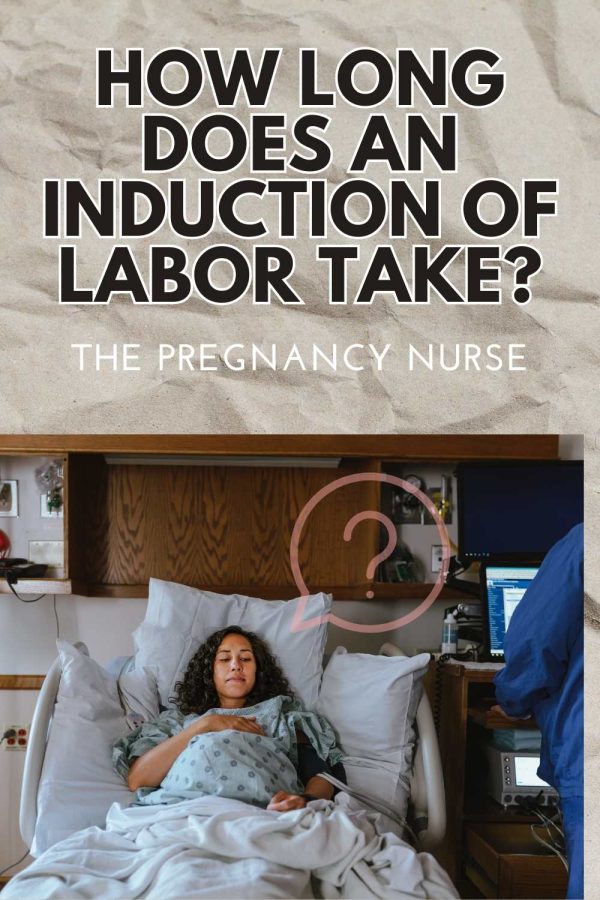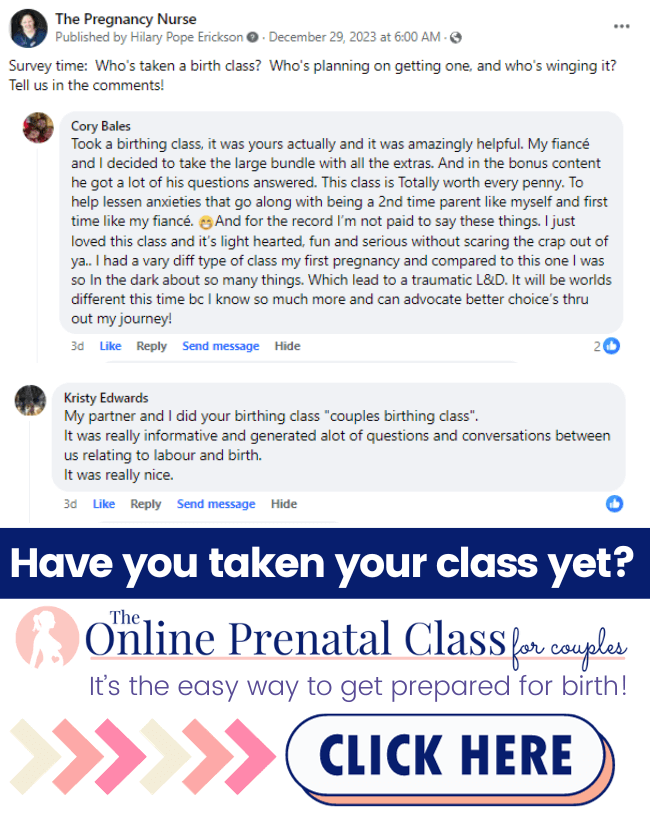There is a lot to get done as you head to your due date or before an induction. Some of it is educational, but there is also preparation for your hospital stay and for how you will feel before you come home!
Before you get induced you 100% need to grab my induction question checklist — it’s going to be your guide to talking to your provider to get the information you need to make a choice (because it is ALWAYS your choice — even if it doesn’t feel that way). You can STILL have this conversation even if the induction is tomorrow (call their office — they should 100% talk with you).
Keep in mind that MOST often they won’t start an induction on pregnant women until you’re 37-38 weeks of pregnancy — and even then (or earlier) your healthcare provider will need to provide a good reason you need to be induced. If you’re having an early induction I have a whole post on 37 week inductions.
And by ALL MEANS do NOT do Castor Oil (sometimes called Midwives Brew). For real. Today we’re just talking about starting an induction in the hospital (and we would never use castor oil as it has many risks).
What’s in This Article (click on an area to jump ahead)
What to Do Before an Induction of Labor:
Talk to Your Provider
Before an induction, your doctor has a duty to give you informed consent. Informed consent includes:
- Risks — like a higher risk of a cesarean section, uterine rupture or other potential risks.
- Benefits — like stopping any further advancement of your pregnancy complication, or hurting baby’s health.
- Alternatives — like waiting.
This is especially true of a medically necessary induction. That means an induction because there is a medical reason your provider thinks you need it. They should be very clear on the medical reasons you’re needing an induction. That helps you pick your best option for delivery, as an informed decision.
I actually just did a podcast on being informed about your induction that you might enjoy:
It’s important to remember that an induction is always YOUR choice, not your provider’s. You shouldn’t do it until you feel comfortable with the plan of care going forward (we talk a bunch about that in that podcast above)
And, like I said — grab this question checklist it’s SO helpful (and will stop a lot of the issues I see with patients having an induction in the hospital and are caught-off guard by what they’re facing):
Top Reasons Why People Need a Medically Necessary Induction:
You can be induced for various reasons, but the most common reasons are pregnancy complications that include:
- Baby too big (LGA)
- Baby too small (SGA)
- Too little amniotic fluid (low AFI) or too much fluid (polyhydramnios) in the amniotic sac
- Diabetes — gestational diabetes or otherwise
- Preeclampsia — often found with high blood pressure
- Cholestasis (a blockage of your bile duct in pregnancy which can be dangerous)
I also discuss these reasons in my post on 37 week inductions, because there should be a pretty good reason to be induced at 37 weeks (like one of those that I listed).
Make sure you understand how your doctor plans to start uterine contractions, because there are a few ways (including misoprostol and Pitocin).
FYI Misoprostol is a cervical ripening agent, and Pitocin is the synthetic of the hormone oxytocin (that our body makes naturally). There are few ways induce people (frankly, not that many) but I discuss them all in here.
Most often the earlier you are in your pregnancy, the longer your induction can take (and if it’s your first pregnancy, it can be even longer). Those who are of a greater gestational age might take less time.
Pro Tip: Your provider has a guess as to how long your induction will take when they schedule it, so you’re welcome to ask them!
Reasons for an Elective Induction
An elective labor induction is where you make the choice to be induced, and can only be decided for a term pregnancy (so, after 39 weeks of pregnancy). This happens for a lot of healthy pregnancies.
There are a lot of reasons to choose to be induced, but your doctor should still inform you of the risks, benefits and alternatives.
You should consider all of that carefully as I am a fan of letting mother nature take her course. With an induction of labour there are increased risks (like a cesarean delivery), the less medical interventions we give you the better. But, many women are so uncomfortable towards the end of pregnancy they desperately want to be induced, and your doctor likely understands such cases.
Of course, many people’s baby has more risks inside than outside and induction can be amazing in those cases as well. You just have to decide what’s best for you at that point in time you are at.
Of course, if your water breaks, and they have to start pitocin, that’s more of an augmentation vs an induction….
If your induction is soon, you may feel like it is too late to take a birth class but it is NOT! I think people having an induction EXTRA need a class — this one can be done in just three hours!
Looking to get prepare for your birth? I have some easy options for you!
~~~~~~~~
– Worried you’re missing something? Grab my pregnancy planner so you don’t miss a thing!
– Thinking about an induction? Grab Inductions Made Easy to feel prepared in just 20 minutes!
– Wondering how to get that baby OUT? Grab Going Into Labor Made Easy so you know how to (and not to) do it!
– Postpartum got you anxious? Check out Postpartum Care Made Easy so you can stay SAFE even when all your attention is on that little on.
🚨 AND if ALL OF IT has got you on edge The Online Prenatal Class for Couples is perfect for you — You’ll feel so ready before you even know it!
~~~~~~~~
No matter WHERE you are at in your pregnancy journey, we have resources that can help!
Understand what will happen during your induction.
After you and the doctor make the decision to be induced, it’s time to learn what will happen during your induction process.
I give you a basic idea in this post on how long induction can take.
Your provider can tell you more specifics to your own healthcare situation.
Many times which medication they choose will vary depending on your vaginal exam (which is part of the bishop score — which helps them decide if you’re a good candidate for induction).
Your Last Meal Before Induction
If you have time to eat before your provider sends you in for an induction (most often you should), choose carefully what you eat. A few tips:
- Don’t eat TOO much — your stomach isn’t built to hold a lot of food while you undergo a stressful event like labor — so it is likely you’ll see that food again as you throw up. A light meal is best. That being said —
- EAT — unless your doctor says not to eat (and I’d find out why), EAT. So many come in from home without having eaten. We may or may not be able to feed you (depending on your doctor’s orders) — so get something to eat.
And honestly, I’d make it something you love. It’s your last meal before motherhood will change a lot — so enjoy it!
I know a lot of people say spicy food will put you into labor, but for most women it just gives heartburn — so just eat a light meal that you will enjoy.
Before Induction Checklist
Heads up! 👀 There may be affiliate links in here – I might earn a smidge with your click. No cost to you, just good vibes! Check my boring stuff for deets.
Beyond the medical stuff, there is still plenty to be DONE before you have an induction.
Enjoy the chance you have for a little plan in the un-plannable, and make sure to get these things done or ready:
Plan daycare
If you have other kids at home, make sure there is a safe place for your other child(ren). Have a basic idea of what dad will be doing while you’re in the hospital.
Finish Your Birth Class
I really DO think it makes birth better. I love this one, and I think you’ll love it too!
Things to Prepare Before Baby:
Get Ready for Baby
I have a post with all the NEEDS you need for baby, and if you have some things you need to set-up get those set-up. All that movement is good for your body and for the baby — plus, you’re being productive!
Get the Carseat Ready
The ONE thing you can’t leave the hospital without is the car seat, so be sure to put it in the car and know how to use it.
SO many new parents have no idea how to even use their carseat. And officially we are not allowed to show you how to use it (at least at most hospitals).
Prepare for Postpartum Care
There are some things you’ll also need for your postpartum body:
That checklist has all the things you’ll want — but let me give you the top 3:
LARGE pads — I actually mean Depends (these are adult diapers). This will prevent you from leaking when you sleep or nap (you will bleed a lot in the beginning, and holding your urine might also be an issue).
Some women prefer these washable undies.
I would also recommend getting a couple of packs heavy pads for once you’re not bleeding as much.
A Periwash bottle (but I’d get a Tushy if I could — I review it here).
I am also a big fan of “padcicles” — I hope to do a video about it soon, but google it and you’ll find some good recipes. You put them on your bum when you’re sore, and sound so great.
Back in the day I just kept Tucks in the fridge — but — padcicles sound better.
I have a whole video on how you’ll take care of your bottom after baby…
Postpartum life seems to be the thing that catches the MOST people by surprise… that’s why I put two full lessons in here on it. No surprises for those smart couples!
Pack your bag
You have a chance to be really methodical about what you put in your bag. I have a whole post that outlines what to put in your hospital bag on my sister blog. It includes a labor bag, postpartum bag, baby bag and a dad bag.
Keep in mind that labor starts pretty slow with an induction, so be sure to pack a few things that can help you pass the time a bit better. It could be a little bit (sometimes even a couple of days) before you’re in active labor (and if it’s your first time having a baby it could be even longer).
Take time for YOU!
Sleep
Whatever you can do to get some decent sleep the night before your induction, it will be worth it. Things I recommend:
- Relaxing essential oils.
- Possibly a benedryl (ask your health care provider) if you’re feeling anxious and can’t stop your brain.
- Maybe a long walk before bed to tire you out..
- A prenatal massage might be nice
- Listening to a meditation that relaxes you!
If you think you may have a hard time going to sleep the night before your induction, you can always ask your provider for a sleeping pill (even just a half or a quarter of it) so you get some rest!
Write About It
I always recommend expectant parents to write about what they expect parenting to be like, and their goals and aspirations. Someday you’ll look back and happily remember the hope of what things would be like. 🙂
Induction Pro Tip (that no one talks about):
While you have an scheduled induction of labor, keep in mind that the hospital can’t always accept you at that time (vs spontaneous labor where they are required to). Perhaps a phone call the night before might help you understand the likelihood of you being “bumped” by someone who has gone into labor or has more significant needs than yours. The hospital is not like a hotel.
Don’t Do These Things Before your Induction:
I already mentioned a few of these things:
- Don’t eat a GIANT meal the night before — just a sensible one that you enjoy
- Don’t stay up worry about your induction. Take a quick class and then maybe even ask your provider if you can take something to sleep
- Don’t let your provider make your choice for you. Remember, an induction is your choice no matter what they say.
I want to listen….
I actually just did a podcast episode on this topic — you can listen right here:
Day Before Induction FAQ’s
I strongly believe that if you haven’t been able to weight the risks and the benefits of an induction you should ask to speak with your provider until you’re sure it IS the best thing (we talk about provider communication in here).
As you won’t be able to use your “at home” coping skills (with your comfortable surroundings) and because labor may come on faster/harder than it would with spontaneous labour — many women do find that they would prefer to have an epidural.
Honestly, not that much. You can still have much of what you’re hoping for — your entrance into labor will just be a bit different.
Well, you’d welcome to ask your provider to try it, but if you REALLY want to be induced and give it a real try — a full medical induction is your best (and safest) bet. If it was me, I’d ask to have a membrane sweep the day before an induction so my cervix might be softening in advance (I hope).
The actual induction process, no. But it might be a bit quicker on your next baby! A first time mom often needs to push about 2 hours, and usually those last couple of centimeters go a bit faster if you’ve already had a vaginal delivery.
Well, it might. I always recommend packing a few items to pass the time.
Your provider will order a specific method for the nurses to initiate. You can talk with them about your choices.
Some studies show that with an induction you do have a bit of an increased risk for a caesarean section vs spontaneous contractions of the uterus. However, some show you don’t — so make sure you understand the risks and benefits with your care team.
Hopefully, this helped get you ready for your induction. It’s a lot to prepare for (both physically and mentally)
BUT, even if your induction is tomorrow — there is a whole lot of other things to think about too. It truly is NOT too late to take a prenatal class. The Online Prenatal Class for Couples can be done in just 3 hours — and I even have key point videos that you can speed through if necessary (think of them as the labor cliff notes). Come join me in the class.
And, if you’re not quite sure you’re ready for that, check out my free prenatal class. It’s your first step toward becoming your own birth boss.












 What to Do If You Don’t Like Your Labor Nurse
What to Do If You Don’t Like Your Labor Nurse

[…] A lot of doctors say you can’t eat when you’re on pitocin (which is why I recommend eating before an induction). […]